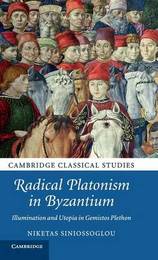
|
Radical Platonism in Byzantium: Illumination and Utopia in Gemistos Plethon
Hardback
Main Details
| Title |
Radical Platonism in Byzantium: Illumination and Utopia in Gemistos Plethon
|
| Authors and Contributors |
By (author) Niketas Siniossoglou
|
| Series | Cambridge Classical Studies |
|---|
| Physical Properties |
| Format:Hardback | | Pages:472 | | Dimensions(mm): Height 216,Width 140 |
|
| Category/Genre | Western philosophy - Ancient to c 500
Christianity
Ancient religions and mythologies |
|---|
| ISBN/Barcode |
9781107013032
|
| Classifications | Dewey:189 |
|---|
| Audience | | Postgraduate, Research & Scholarly | |
|---|
| Illustrations |
1 Tables, black and white
|
|
Publishing Details |
| Publisher |
Cambridge University Press
|
| Imprint |
Cambridge University Press
|
| Publication Date |
3 November 2011 |
| Publication Country |
United Kingdom
|
Description
Byzantium has recently attracted much attention, principally among cultural, social and economic historians. This book shifts the focus to philosophy and intellectual history, exploring the thought-world of visionary reformer Gemistos Plethon (c.1355-1452). It argues that Plethon brought to their fulfilment latent tendencies among Byzantine humanists towards a distinctive anti-Christian and pagan outlook. His magnum opus, the pagan Nomoi, was meant to provide an alternative to, and escape-route from, the disputes over the Orthodoxy of Gregory Palamas and Thomism. It was also a groundbreaking reaction to the bankruptcy of a pre-existing humanist agenda and to aborted attempts at the secularisation of the State, whose cause Plethon had himself championed in his two utopian Memoranda. Inspired by Plato, Plethon's secular utopianism and paganism emerge as the two sides of a single coin. On another level, the book challenges anti-essentialist scholarship that views paganism and Christianity as social and cultural constructions.
Author Biography
Niketas Siniossoglou is a British Academy Postdoctoral Fellow and Junior Research Fellow of Wolfson College, Cambridge. He is the author of Plato and Theodoret: The Christian Appropriation of Platonic Philosophy and the Hellenic Intellectual Resistance (Cambridge, 2008).
Reviews"This stimulating book will offer much food for thought, even to those readers who, in the end, will not be prepared to accept all of Siniossoglou's conclusions." --BMCR
|